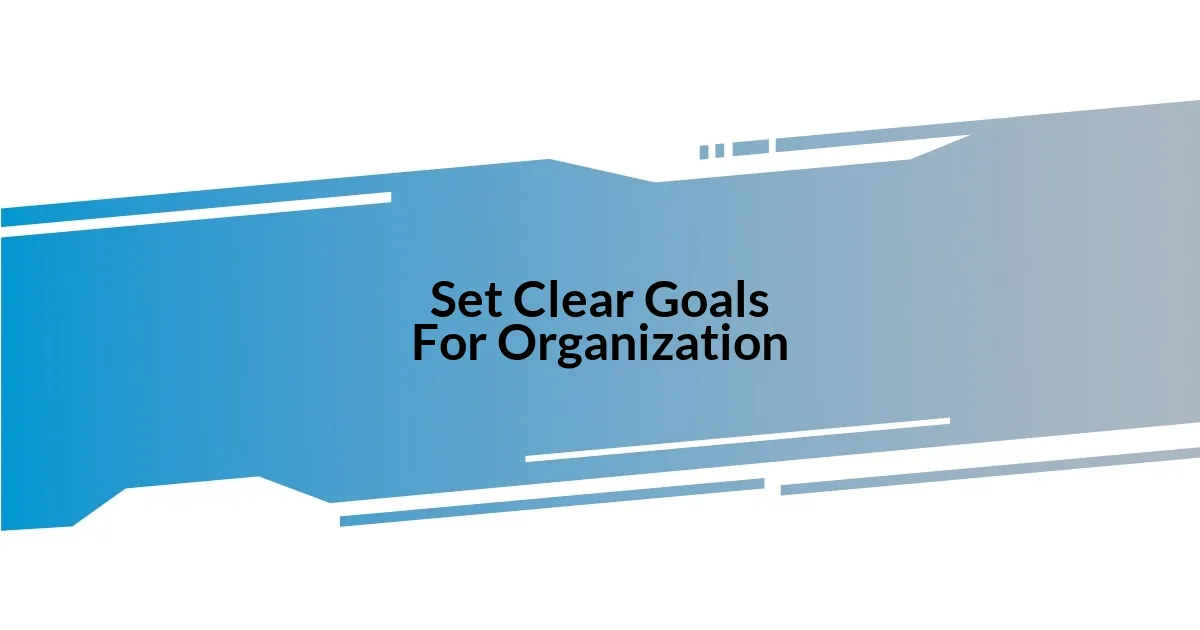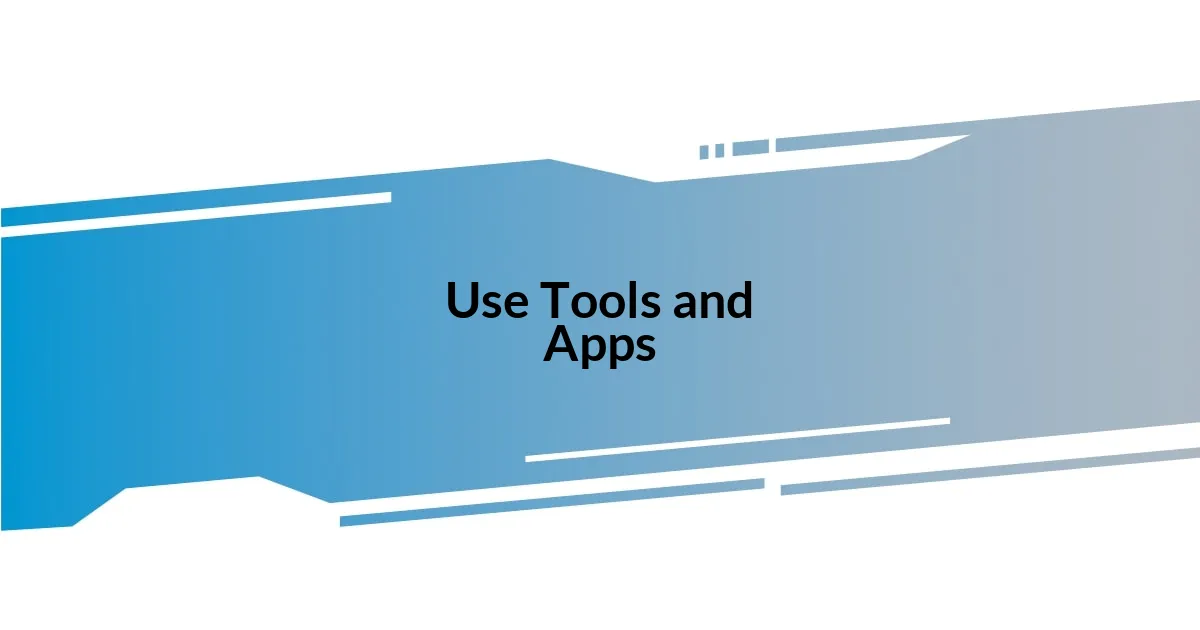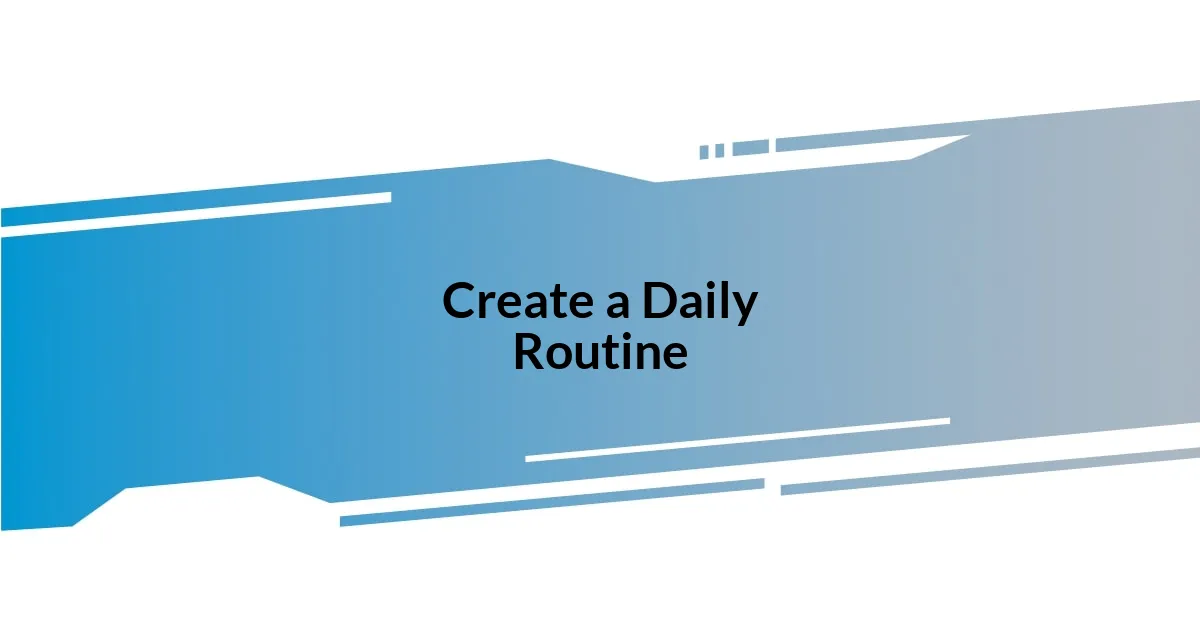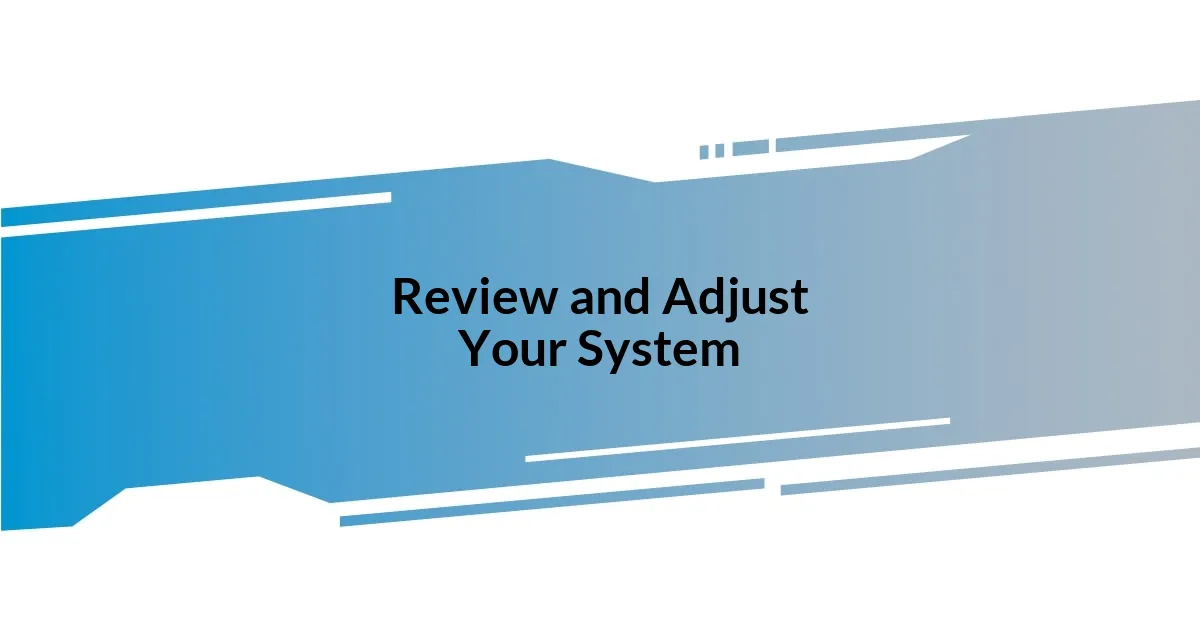Key takeaways:
- Understanding your organizational style helps create effective systems tailored to your preferences, such as color-coding or minimalism.
- Setting SMART goals for organization breaks tasks into manageable pieces, promoting a sense of accomplishment and reducing stress.
- Regular decluttering and using tools/apps streamline workflow and enhance productivity, turning chaos into clarity.
- Staying motivated through celebration of small wins, inspiration boards, and continuous learning fosters a positive and dynamic organizational approach.

Understand Your Organization Style
Understanding your organizational style is crucial for developing systems that truly work for you. For instance, I’ve realized over time that I thrive in a space that feels visually organized but also has a certain level of creative chaos. Have you ever noticed how some people seem to keep their desks pristine, while others have a more eclectic setup? Recognizing what environment energizes you can lead to a more effective organization strategy.
When I delve into my own habits, I can identify patterns that reflect my needs. For example, I tend to favor color-coded systems because they visually appeal to me and help me prioritize tasks at a glance. Isn’t it fascinating how a simple color can evoke a specific emotional response or reminder? This is the kind of insight that brings clarity to your organizational style.
As you explore your preferences, consider asking yourself what tools or methods resonate with you. Do detailed lists give you satisfaction, or does a digital planner spark joy? Reflecting on past experiences, I noticed that during stressful periods, a minimalist approach worked wonders for my mindset. Finding what aligns with your personality can make the organization feel less like a chore and more like a personal expression.

Set Clear Goals For Organization
Setting clear goals for organization not only helps streamline your efforts but also ignites a sense of purpose. I remember a time when I faced an overwhelming project at work. I simply broke it into smaller, actionable goals, and that act alone made the tasks feel manageable. Have you ever tackled a huge undertaking by dividing it into bite-sized pieces? It’s a game changer!
When I define my goals, I try to make them SMART: Specific, Measurable, Achievable, Relevant, and Time-bound. For instance, if I want to declutter my home office, I focus on one area each week instead of attacking the whole room at once. This not only reduces stress but also gives me a sense of accomplishment after each small goal is met. Have you found that celebrating small wins motivates you too?
Lastly, regularly reviewing and adjusting these goals keeps them relevant and energizing. Recently, I found that my original goal of keeping my workspace purely minimalist wasn’t working for me anymore. By adjusting it to allow for a curated collection of inspiring items, I’ve created an environment that fuels creativity instead of stifling it. What adjustments can you make in your goals to better fit your evolving needs?
| Goal Type | Description |
|---|---|
| Short-term Goals | Tasks that can be achieved quickly, creating immediate results. |
| Long-term Goals | Broader objectives that require time and sustained effort to achieve. |

Declutter Your Space Regularly
Declutter Your Space Regularly
Taking the time to declutter your space can transform your environment and mindset. I’ve often found that just a few minutes spent clearing out unnecessary items can do wonders for my focus. Picture this: a cluttered desk filled with papers and random objects creates a sense of chaos, while a tidy space invites clarity and inspiration. Can you relate to the difference it makes when you walk into a freshly organized room?
- Set a regular schedule for decluttering (weekly or monthly) to maintain your space.
- Focus on one area at a time, such as your desk or a closet, to avoid feeling overwhelmed.
- Donate or discard items that you no longer use or love; it’s liberating to let go!
- Create a ‘maybe’ box for items that you’re unsure about, giving yourself time to decide.
I remember a point when I couldn’t find my favorite book because it had been buried beneath a mountain of papers. That realization hit hard—it was time to take action and tackle the mess. I dedicated a Sunday afternoon to going through everything. The feeling of lifting each item and deciding its fate became almost therapeutic. I encourage you to experience that rejuvenation for yourself. How does it feel to reclaim your space?

Use Tools and Apps
Utilizing tools and apps can drastically enhance your organizational game. When I first discovered task management apps, my workflow transformed completely. I used to scribble down to-do lists on random scraps of paper, only to lose them within days. Have you ever found yourself searching frantically for a note that slipped away? Once I switched to a dedicated app, such as Todoist, everything became streamlined. I could prioritize tasks, set deadlines, and even share lists with colleagues. It felt like I had a virtual assistant keeping me in check.
I also love using digital calendars. For me, Google Calendar is a lifesaver, allowing me to block out time for focused work, meetings, and even personal projects. There’s something deeply satisfying about seeing everything laid out visually. Plus, the reminder notifications help me stay on track and prevent those last-minute scrambles. Have you experienced the ease of planning when you can see your schedule all in one place? It can turn chaotic days into well-orchestrated events.
Finally, I’ve started using note-taking apps like Evernote to capture ideas on the fly. I remember a moment when inspiration struck during a long walk, and instead of losing that brilliant thought, I quickly jotted it down on my phone. The ability to access these notes later has allowed me to turn fleeting ideas into actionable plans. How many times have you had a great idea but forgot it seconds later? It’s remarkable how the right tools can help safeguard those precious moments of creativity.

Create a Daily Routine
Creating a daily routine is one of the best ways to bring structure to your life. I remember when I first established a morning routine—waking up at the same time, making my bed, and enjoying a leisurely breakfast completely changed my mornings. It’s amazing how those simple habits set a positive tone for the day. Do you have any consistent rituals that help you kick off your day right?
In my experience, incorporating blocks of time for specific tasks does wonders for productivity. For instance, I designate mid-morning for deep work and reserve afternoons for meetings and emails. This segmentation allows me to focus without interruptions. Have you noticed how different tasks require different energy levels? Tailoring your routine to match these can really enhance your efficiency.
Lastly, I’ve found that flexibility in my routine is key. Life can throw unexpected surprises your way, right? I remember a day when a sudden family commitment disrupted my carefully planned schedule. Instead of panicking, I adapted and shifted my tasks around. This taught me that while routines are important, being adaptable allows you to maintain organization without feeling overwhelmed. What strategies do you use when your day doesn’t go as planned?

Review and Adjust Your System
Regularly reviewing and adjusting your organizational system is crucial to ensuring its effectiveness. I’ve learned the hard way that clinging to outdated methods can lead to chaos. For instance, there was a time when I relied solely on paper planners, but as my commitments grew, I found them insufficient. Are you still using a method that isn’t serving you well? It might be time to reassess.
When I take the time to reflect on what’s working and what isn’t, I often find new insights. After a particularly busy month, I realized I was missing deadlines more often than I liked. That was a wake-up call! I adjusted my system by implementing a weekly review, where I assess my tasks and adjust priorities accordingly. Have you ever thought about creating your own review sessions? It can be a game-changer for staying on top of your responsibilities.
I also adjust based on feedback from my environment. For example, a colleague mentioned that they struggled to keep up with our shared project deadlines, making me realize I needed to communicate more clearly about our timelines. It made me rethink how I organize my collaborative efforts. Have you ever considered how others perceive your organizational habits? Sometimes, an external perspective can help refine your system even further.

Stay Motivated and Inspired
Staying motivated and inspired can sometimes feel like a challenge, especially when the day gets hectic. I remember a particularly overwhelming week when deadlines piled up, and I felt my enthusiasm waning. To combat this, I started keeping a small inspiration board in my workspace with quotes, images, and reminders of my goals. It’s amazing how a simple visual can reignite that spark! Have you ever tried creating a space that cultivates positivity for you?
Another trick I’ve found effective is to celebrate small wins, no matter how minor they seem. For example, after completing a task I had been dreading, I treated myself to my favorite coffee. Those tiny moments of recognition can fuel my motivation to tackle bigger challenges. Isn’t it rewarding to acknowledge progress along the way? I believe it’s these little acts of self-kindness that keep the motivation flowing.
Lastly, I regularly seek out new sources of inspiration, whether it’s reading a book, listening to a podcast, or attending a workshop. There was a time when a simple podcast episode about productivity reinvigorated my approach to time management. I found myself eager to implement new techniques! What has inspired you recently? Embracing fresh ideas not only keeps your organizational strategies dynamic but also rekindles your passion for the work you do.